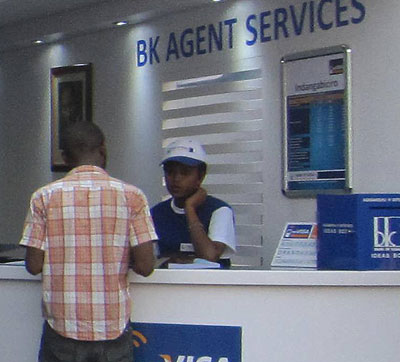Despite facing challenges, especially within the rural areas, agency banking is slowly gaining acceptability, commercial banks have said. Maurice Toroitich, the managing director of KCB Bank Rwanda, one of the four banks using the model, told Business Times in an interview that the major hurdle the two-year old banking concept faces is creating trust between the agent and the client. Toroitich said many people do not use agency banking outlets because they don’t trust the agents. “People think that agents will monitor their account balances,” he said.


Despite facing challenges, especially within the rural areas, agency banking is slowly gaining acceptability, commercial banks have said.
Maurice Toroitich, the managing director of KCB Bank Rwanda, one of the four banks using the model, told Business Times in an interview that the major hurdle the two-year old banking concept faces is creating trust between the agent and the client.
Toroitich said many people do not use agency banking outlets because they don’t trust the agents.
"People think that agents will monitor their account balances,” he said.
KCB was the first bank to introduce the model in Rwanda in 2012.
Agency banking allows commercial outlets, including shops and supermarkets, to act on behalf of banks. The service allows a client to withdraw or deposit cash, acquire and repay loans, pay bills and transfer money.
Equity Bank, Bank of Kigali and Urwego Opportunity Bank are the other institutions that use the cost-saving banking model.
Kizito Okute, the head of agency banking at Bank of Kigali, noted that there is need for more education and sensitisation to help change the customers’ mindset to understand the benefits of agency banking.
He added that the requirements for one to become an agent are prohibitive and are constraining growth.
"It is not easy to always find an existing business that meets all the requirements and is also interested in offering the service,” he pointed out.
"For instance, one is supposed to have operated a business for a minimum of 18 months. The fact that some may not be registered businesses or companies but meet other criteria, makes it hard to recruit agents,” he explained.
The central bank monetary policy and financial stability statement released in August indicated that there were a total of 1,161 banking agents countrywide by the end of June last year, up from 844 at the end of 2012.
Experts say the number will greatly increase in coming years as the public gets to understand the huge benefits of agency banking and embrace it to ease financial transactions.
"The approach takes financial services nearer to the people as they no longer walk long distances to deposit or withdraw money.
"Besides, it will help more people, especially in the rural areas to join the formal banking sector and boost banks’ deposits and capacity to lend to the private sector,” the experts said.


